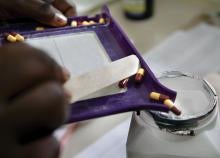Perspectives of health practitioners on the challenges to accessing sexual and reproductive health care services for Venezuelan migrant women during the COVID-19 pandemic in Quito, Ecuador
Objectives
To describe the perspectives of health practitioners on the barriers, gaps, and opportunities that Venezuelan migrant women experienced to accessing sexual and reproductive health (SRH) services during the COVID-19 pandemic and how SRH services were affected in Quito, Ecuador.
Methods














